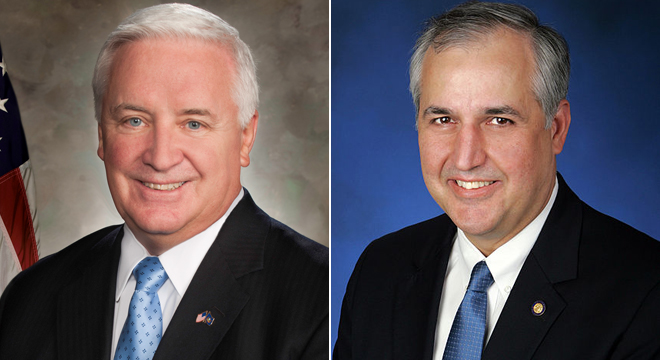Pennsylvania Republicans, who won the governorship and full majority control of the legislature in 2010, are now setting their sites on a major change — to the state’s Electoral College votes, which have been regularly won statewide by Democrats for 20 years, in the winner-take-all system used by nearly all the states.
The Pittsburgh Post-Gazette reports that Gov. Tom Corbett and state Senate Majority Leader Dominic Pileggi are proposing that the state divide up its Electoral College votes according to which candidates carried each Congressional district, plus two votes for the statewide winner. The system is used by Maine — which, despite the system, has never actually split its four electoral votes — and by Nebraska, which gave one of its five votes to Barack Obama in 2008.
Pennsylvania, however, will have 20 electoral votes in the 2012 election. What’s more, the measure would give even greater meaning to the state’s redistricting for the House of Representatives, giving it a powerful effect over the presidency in addition to the House.
Pennsylvania has voted Democratic in every presidential election since 1992, and voted for Barack Obama by 55%-44% in 2008. Indeed, over the past 50 years it has only voted Republican in presidential landslides for the GOP: 1972, 1980, 1984, and finally 1988. While the results have sometimes been narrow for the Dems, it is a state that can be expected to vote Democratic for president in the context of a close national campaign, such as its votes for Al Gore in 2000 and John Kerry in 2004.
Had this proposed system been in place in 2008, when Obama won the state by a ten-point margin, he in fact would have only taken 11 out of the state’s 21 electoral votes at the time — due to a combination of past Republican-led redistricting efforts to maximize their district strength, and Obama’s votes being especially concentrated within urban areas.
As can be expected, the Post-Gazette reports that Democrats are attacking the proposal as a partisan power-grab, while Republicans are standing by it as a reform that would focus attention on districts throughout the state:
Blasting the idea as “a disturbing effort to put their self interests and party interests ahead of the people,” Senate Minority Leader Jay Costa, D-Forest Hills, said the plan would dangerously link the presidential vote to redistricting. In a written statement, Mr. Costa asked: “Will we now be looking at state gerrymandering that serves a larger, national agenda?”
Mr. Pileggi and others disagreed, saying congressional districts that are more competitive would receive more attention and would not be overshadowed when the state leans one way or another politically.
“It would not only change the type of attention that Pennsylvania would receive in a presidential election, but it would also choose where in Pennsylvania that attention occurs,” he said.









